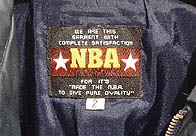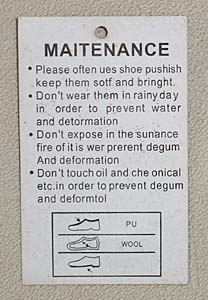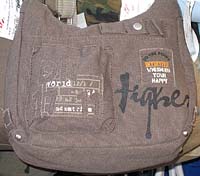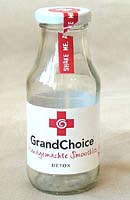 |
 |
 |
 |
 |
 |
 |
 |
 |
 |
 |
 |
 |
 |
 |
 |
Bloopers!
When it comes to advertising, it's the little things that count.
Too many companies, not anticipating the sometimes subtle differences between countries and continents, send their products abroad without sufficient prior research. Later, they wonder why the sales results don't match expectations.
Here's a collection of
real-life mistakes and some examples of machine translation, a technology
that isn't quite capable of all that's often claimed for it. See why you
need a real life flesh and blood native speaker to help you wade the treacherous
waters of multilingual communication?
Billboard in Frankfurt Airport, Germany
"I have a cream." (Headline of ad selling shaving foam.)
No
doubt, the copywriter thought people would think of Martin Luther King's
famous quote, "I have a dream!" but this is generally a distant
second association for the native English speaker, whose first thought
is decidedly less acceptable in polite company.
French label of foreign-produced goods
"Fabriqué en Dinde" (Made in Turkey)
Turkey
(the bird) is "dinde," whereas the country is called "la
Turquie".
American cookie packaging (promotion)
"Win a Milano Weekend!"
...with an illustration of the Eiffel Tower
Well,
at least the continent was right. So what if the country was wrong? The
cookies, named for the city of Milan, Italy is not the location of the
Eiffel Tower, which is in Paris, France.
Brand name of handbag in Germany
"Down And Out"
Perhaps
it's an expat American in Hong Kong who's writing things like this, but
clearly, the manufacturer of this woman's purse doesn't know that the
English expression, "down and out" means to be down in the dumps
and out of money, out of work, out of luck, out of friends... in other
words, "buy this purse and exude failure!"
Instructions on children's clothing label
"washing from left side" (wash inside out)
This
is a literal translation of the German washing instructions, a superb
example of the phrase "something got lost in the translation".
Good intentions plus a dictionary don't necessarily equal a translation.
And neither does that which comes out of a computer translation program.
Read on.
Operating instructions of German refrigerator
"WARNING - THIS APPLIANCE MUST BE EARTHED"
This is okay for a British market, but to my American ear, it sounds like they want me to put a handful of potting soil in my fridge. In American English, this should say "grounded".
For
more on the differences between American and British English, visit Jeremy
Smith's extensive American
- British / British - American Dictionary.
Belgian Trade show announcement
"Zwei Wohnzimmer von Unternehmen von Gesellschaftlicher Wirtschaft" (Two Living Rooms from Business Economy Companies)
The
French original was "2ième Salon des Entreprises d'Économie
Sociale" or "2nd Expo of Social Service Businesses". A
computer "gisted" an uproarious title in German. Is the "gist"
of your text really sufficient to convey your message?
Swiss advertising agency's web site, translated by machine
"Grope along forwards."
The original German was a play on words that justified the line to the copywriter in the original. But in English, without the double entendre, it's just a very bad way to approach a web-surfing potential client. Whether insulting or self-deprecating, it's a line no anglophone would ever use to attract a client.
"How did you find to us? Over a search machine? No miracle! Our proclamation service brings also your Site under the Top Ten of the search results -- and as result up to 60% more visitor ."
No need to explain this one. It's understandable, even if it brings a smile to the reader. But is this how you want your well-written original copy to read in other languages? Understandable, but the reader will have to "grope along forwards?"
The
bizarre thing is that this site was otherwise very professional. The link
to an online translation program appeared to have been set up as a joke,
though this wasn't necessarily apparent to the reader. What was clear,
however, was that the machine translation made the agency look like a
joke.
Not quite what it's cooked up to be
"Point constituents
- 1 - Sour cream of the Cup (calorie-poor or grease-free)
- 1 - vanillavanilla vanilla
- of pulverized sugars
- * of the Cup
- 1 - Cuperdbeereglasur or strawberry jelly
Preparation:
Soften frischkaese to the ambient temperature - approximately 30 seconds in the microwave.
Slowly add you sour cream, eggs, milk, sugar and vanilla frischkaese and impact well.
Pour in crust and bake you 25 minutes with 350 degrees or to enterprises in the center.
Cooling it for 20 minutes of 0.
Mix point constituents and pour you over cheese cakes. Bake 5 minutes with 425 degrees. Cool one hour at least.
Operate easily strawberries and blue berries on cheese cakes in marking sign or streifenmuster. Spoon glaze or jelly on berries. Cool some hours. Serves 8-10."
Did you get all that? It's from a recipe web site that, as a public service, has machine translations of its (English) pages. The above is actually a Babelfish translation of the German version, so it's two generations from the original, but it's fairly close to how the German translation looks to a German.
Jacket label from Turkey
WE ARE THIS
GARMENT WITH
COMPLETE SATISFACTION
* NBA *
FOR IT'S
"MADE THE N.B.A.
TO GIVE PURE OVALITY"
This is inspired writing. Previously, I thought one had to go to Asia to find this much creativity and wit, but this Turkish Delight proves otherwise. Though I must confess to being a fan of "wonderful" bad translation, as an advertising professional, I would never let a client produce something like this. Click here to see a larger photo of this label.
Hang Tag from Sweet Day Shoes
And you thought "pure ovality" was impressive! I confess, I don't have a clue as to what this means or where it was written. But it gets the message across beautifully: we don't speak your language!
Ice cream parlor menu in Italy
Tartufo Cup
Ice-cream at
flower of milk, fused chocolate, minced of filbert and climbed on whipped
cream
(In price is
included service)
In some cases, it’s easier to read the original, even when you don’t speak the language! The photo looked great, but the translation looked terrible. Tourists love such things because they make great stories when the vacation is over, but is that how you want to be remembered? Sadly, it’s not just the small business that tries to get away on the cheap. Read on.
Blooming Baroque and other Germanglish at ludwigsburg.de
"There are already more than enough boring towns"
This is something
which Duke Eberhard Ludwig is often quoted as having said. People tell
that this point of view was one of the reasons why he let built Ludwigsburg.
The magnificent centre of the town is the Residential Palace with the
porcelain factory which was founded by Duke Carl Eugen in 1758. Next to
it, and just as imposing, are the hunting lodge and summer residence Favorite
and the Lakeside Palace Monrepos. The 30 hectares gardens surrounding
the residential palace are home to the garden show Blooming Baroque and
the Fairy-Tale Garden. In the centre of the town you can have a look at
the baroque living quarters and the birth houses of famous poets, go shopping
and try out the local restaurants.
Who signed off on this blooming translation anyway? Certainly not a native speaker, who would have known the euphemistic usage that has less to do with flowers and more to do with its similarity to another, less polite English word. Though it may be the funniest, it's certainly not the only mistake. Speakers of German will "hear" the original when reading through this short paragraph of mangled English. Others will just laugh.
Shoulder bag for sale in German shop
To The Point
INTUITIVE
Whishing Your Happy
I
thought I’d seen it all, and then I found this. The grammatical and
spelling mistakes abound and compound into a delightful display of inanity…
if professional integrity is not an issue for you. Click on the photo
above (and below) to savor a larger version.
But will it cure your hangover?
GrandChoice
Handgemachte Smoothie
Detox
Yes, you read right, the flavor of this delicious “homemade” smoothie is Detox. The smoothie was actually pretty tasty, a mix of banana and three kinds of fruit juice, with a little fresh ginger for added zing, which I gather inspired the name. Next time, though, they should consult a native speaker when casting about for an English name for their flavor. At least they didn’t add the “word” wellness to it, a buzzword (or should I say, buzz non-word) German marketers just adore. Three cheers for this marketer’s restraint!
©2008 All rights reserved.




